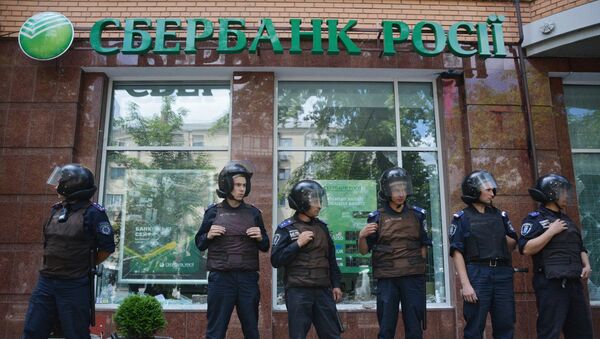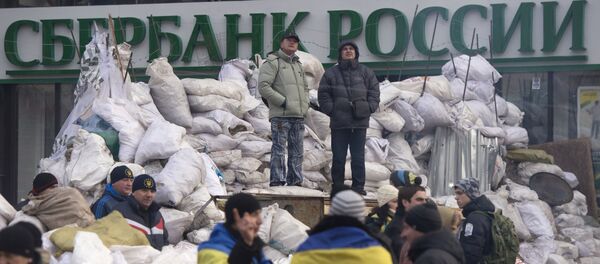MOSCOW (Sputnik) — On March 16, Ukrainian President Petro Poroshenko approved the Ukrainian National Security and Defense Council's proposal to impose one-year sanctions on subsidiaries of five Russian state banks, including Sberbank and VTB. The subsidiaries are no longer able to take assets out of Ukraine. National Bank of Ukraine Deputy Governor Kateryna Rozhkova later stated that all Russian banks partly owned by the government were looking to sell their Ukrainian subsidiaries.
On March 27, Sberbank said in a statement that Latvia's Norvik Banka and a Belarusian company would buy 100 percent of the Sberbank Ukrainian subsidiary's shares, adding that the deal was expected to be closed in the first half of 2017. On March 29, a source in Sberbank told reporters that the deal was expected to be closed between late April and late May.
"We hope to file them this week," Gref told reporters.
Currently, the Ukrainian subsidiary of Sberbank is the country's sixth-largest bank, holding some $2.2 billion in assets and running a network of over 150 offices. The bank has nearly one million customers across Ukraine. By the end of the third quarter of 2016, however, the Ukrainian subsidiary accounted for less than 0.5 percent of Sberbank's total assets.
The National Bank of Ukraine has endorsed the deal. The regulator's press office told Sputnik that the central bank supports the orderly withdrawal of Russian state-owned banks from the Ukrainian market.
Last year, Sberbank's CEO Herman Gref said that the bank would not leave the Ukrainian market despite losses. In early March, however, Gref said that Sberbank would decide on its future in Ukraine by the end of 2017. After Kiev imposed sanctions against Russian state-owned banks, Gref said the bank was looking for options to quickly leave the Ukrainian market. A decision was found in six days.
In mid-March, Ukrainian President Petro Poroshenko approved a proposal from the Ukrainian National Security and Defense Council to introduce one-year-long sanctions on subsidiaries of five Russian state banks, including Sberbank and VTB.
The sanctions came amid large-scale protests by Ukrainian radicals against Russian banks. In particular, in early-March five Sberbank offices were blocked across Ukraine, including in Kiev. After the deal was announced, the blockade was lifted.



